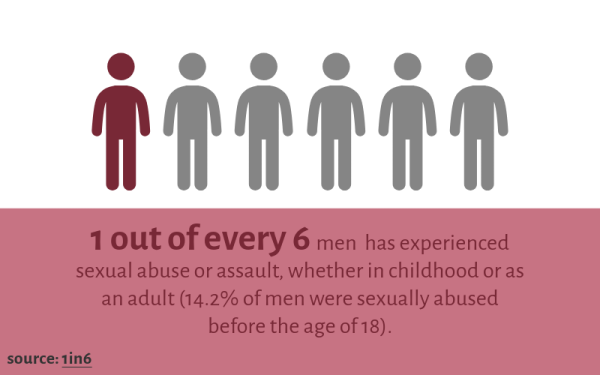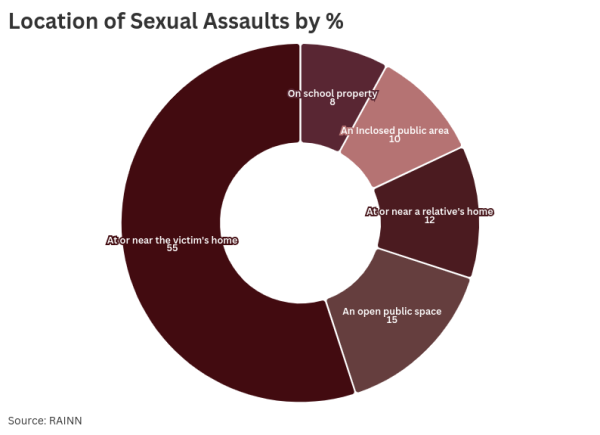More than 27,638,860 men in the U.S. have experienced sexual abuse or assault, according to 1in6.
“Sexual abuse” is used to describe experiences in which a person suffers, submits to, or is subjected to unwanted sexual contact as a result of force, violence, threats, fear, deception, a power differential, exploitation, or without having legally consented to the act, according to the Rape, Abuse & Incest National Network (RAINN).
“That’s hundreds of millions of men, and because there are so many prejudices and so many biases and so many myths and misunderstandings around what it means to be a male survivor of sexual abuse, a lot of guys stay quiet,” said C. Allen Ruyle, a licensed clinical social worker and the treasurer on the board of directors at MaleSurvivor.

MaleSurvivor was formed in 1995 and is an entirely volunteer-driven 501c3 non-profit, public benefit organization that provides resources, treatment, education, and advocacy for men who have a history of sexual trauma and includes clinicians such as Ruyle, who work to support these men.
MaleSurvivor has an international membership of over 15,000 people and works with survivors from over 200 countries worldwide. A majority of the board of directors at MaleSurvivor are survivors of sexual abuse themselves. MaleSurvivor provides a meeting space for men, including discussion boards, monitored chat rooms, and other areas for them to come together and find support from therapists and other survivors.
In the past, MaleSurvivor has hosted national conferences, which have paused due to the global pandemic in 2020. MaleSurvivor continues to be a primarily online organization allowing survivors to find information, resources, and therapists where they can work through the impact of some of the trauma they’ve been through. They are committed to preventing, healing, and eliminating all forms of sexual victimization of boys and men.
Barriers
Organizations such as MaleSurvivor stress the importance of bringing awareness to male sexual abuse victims. The importance stems from inadequate sexual violence education, which has had negative impacts on whether assaults are reported or not. As shown in a study by Campus Sexual Assault (CSA), almost a third of male college students are not educated on what constitutes sexual abuse. This study also shows that 35% of students do not report assault incidents because they are unsure that a crime has been committed.
A study from UCLA shows that men are often overlooked as sexual assault victims; the idea of men as perpetrators and women as victims remains the dominant paradigm. The study covered many factors that have led to this assumption, highlighting that men are seen as sexual beings in society, therefore enforcing the idea that for men, all sex is welcome.
“If you stopped 100 people in the street and asked them: describe to me what childhood sexual abuse looks like, they’re almost all going to describe an older male perpetrator and a young female victim,” Ruyle said.
This idea stems heavily from the stereotypes boys face growing up surrounding masculinity. The expression “boys don’t cry” suggests that if boys are sad or experience emotions, they must hide them. Other phrases such as “toughen up” and “don’t let anybody push you around” set expectations on young boys that they should always be able to protect themselves. These stereotypes lead to the misconception that boys cannot face sexual abuse and that only girls can, according to Ruyle.
“It’s very common for men in their 40s, 50s, 60s, that have been living with their shame for decades to come into my office and tell me, ‘I’ve never said this out loud before,’” Ruyle said.
There is also common confusion between shame and guilt when talking about sexual abuse and other violent crimes. However, these terms have subtle but critical differences in meaning and implications. The main difference between guilt and shame is whether the negative feelings are aimed at one’s wrong behaviors vs. oneself as a person, according to Europe’s Journal of Psychology.
“Shame is much more toxic. That is really what a lot of male survivors carry. They feel shame. They feel broken, unlovable, worthless,” Ruyle said.
Chen’s* Story
For Kai Chen*, It all started with a simple drink he was given while attending a party in what he thought was a safe environment.
“As soon as I got (to the party), they gave me a drink. I didn’t know they had spiked the drink, so I just drank it without suspicion. After a few minutes, my head started spinning; I felt very dizzy and drowsy. My eyes couldn’t focus, and my vision was blurry. I passed out in a room full of people,” Chen said.
According to a study by the American Addiction Center, Around 50% of women and men surveyed have had their drinks or food spiked at least once.

Chen started gaining consciousness around midnight and woke up in a room alone to one of his cousin’s friends performing oral sex on him.
“I wanted to push her away but wasn’t fully conscious yet. I was still weak so I couldn’t do anything, and she just kept on doing it. The worst part was when she pulled out her phone to record, and she jumped on top of me, and she slid my p**** inside of her,” Chen said.
The assaulter had tied Chen’s hands down to prevent resistance. When Chen had fully gained consciousness back, he awoke to be fully nude and watched his also fully nude assaulter untying him.
Days later, he received a video clip of his assault from his once believed-to-be trustworthy cousin, who was laughing and making jokes about the assault.
“That was when I found out they had planned this whole thing. I was very mad, but at the same time, I couldn’t do anything about it. I didn’t tell anyone at all, not even my family. I’m more comfortable about it now than before, but it’s still a scarring experience I have to live with for the rest of my life,” Chen said.
Following the assault, Chen did not reach out or talk to anyone out of feelings of discomfort and shame. One day, one of his friends received the video clip of the assault and reached out to Chen.
“We had a long talk. It was very uncomfortable for me at first. But now, I still feel uncomfortable, but I am more comfortable than before because I’ve stopped caring about whether people think my trauma diminishes my masculinity,” Chen said.
Chen faced many challenges when he started sharing his story with others.
“When people first found out about the assault, they didn’t believe it. They all said it wasn’t possible because I’m a man, and I could’ve easily avoided it,” Chen said.
Throughout his healing process, Chen’s friends became an essential support system. They supported and tried their best to help Chen by ensuring his healing process was positive. Most of all, they stayed by his side throughout it all.
A study by Leech & Littlefield shows that having a strong support system can help to buffer some of the adverse effects that sexual trauma can cause. This support can influence survivors to develop healthy coping skills during healing.
“It is important to spread awareness about male survivors because showing other guys that they matter too is important; it is not just women who face sexual abuse but also men,” said Chen. “Some advice I would give to other male survivors would be to stay strong and to surround yourself with people you feel safe around. There is light at the end of the tunnel.”
Advocacy
There are some organizations dedicated solely to reframing misconceptions. One of these organizations is the National Sexual Violence Resource Center (NSVRC). The NSVRC’s mission is in prevention and education surrounding ways to recognize and provide support to sexual abuse survivors.
According to Halle Nelson, the communication specialist at NSVRC, there is great importance to spreading awareness of sexual abuse because it is a widespread issue that is not talked about and taken as seriously as other violent topics such as physical violence and gun violence.
“It’s essential to show that just because you are a victim of some type of sexual harm and people are not addressing the issue, it does not mean that it is not worthy of recognition,” Nelson said.
The NSVRC partners with various other organizations to help provide education and advocacy. Some of these organizations include the California Sexual Assault Coalition, where they hosted workshops for survivors at the National Sexual Assault Conference. Just Detention International is another organization the NSVRC worked with, in which they worked in partnership to develop materials for male sexual assault survivors, particularly in incarceration.
Another advocacy project the NSVRC is working on is heading the campaign for Sexual Assault Awareness Month, which takes place in April. Sexual Assault Awareness Month is a month-long campaign dedicated to education on sexual violence. This includes helping school campuses get involved, and more specifically, college campuses, which are too often sites of sexual abuse. According to RAINN, male college students ages 18-24 are 78% more likely than non-students of the same age to be victims of sexual abuse.
“Ways schools could be most helpful in providing support is to advertise their Title Nine office heavily and to discuss, in general, what a process might be like going forward, if somebody wants to report a sexual assault that happened to them on campus,” Nelson said.
In the future, Nelson would like to see a more comfortable conversation surrounding the seriousness of sexual abuse in general, as well as the greater inclusion of men in advocacy campaigns.
“Any advocacy about any sort of sexual assault should feature images and stories of men as well as women so that we don’t code it as being a woman’s issue,” Nelson said.
Advocacy includes conversations in the home and with loved ones. According to Nelson, something as simple as telling loved ones that they have a space safe to share their feelings and find support is highly beneficial in opening the conversation around sexual abuse.
“If something is not discussable, it’s not manageable,” Nelson said.
Resources
If you or someone you know has faced sexual violence and are in need of help here are some resources that help provide proper/further support.
National Sexual Assault Hotline: 1-800-656-4673
*In accordance with Carlmont Media’s anonymous sourcing policy, the name of the subject has been changed to protect them from social consequences.



